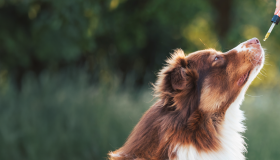
January 13, 2022 — Dr. Kelly Diehl gets down and dirty on fecal microbial transplantation with Dr. Jenessa Winston, Assistant Professor and clinician scientist at The Ohio State University. Dr. Winston discusses the history of this procedure, and how veterinarians are using the technique to treat a variety of diseases, and what the future might hold for this unique therapy.
Resources:
https://onlinelibrary.wiley.com/doi/pdf/10.1111/jvim.14875
https://www.vetsmall.theclinics.com/article/S0195-5616(20)30112-1/fulltext
https://gastro.org/research-and-awards/registries-and-studies/fecal-microbiota-transplantation-national-registry/
https://www.morrisanimalfoundation.org/article/episode-32-fiber-for-dogs-and-cats
https://www.10tv.com/article/sponsor-story/ohio-state-veterinary-medical-center-clinicians-studying-treatment-for-obesity-in-dogs/530-714beddd-946f-4709-8b12-c68235627a16
https://vet.osu.edu/vmc/sites/default/files/images/slim_recruitment_flyer-final.pdf?utm_campaign=vme_marketing-activity_fy21&utm_content=1613584684&utm_medium=social&utm_source=facebook
0:00:06.9 Kelly Diehl: Welcome to Fresh Scoop, Episode 40, the Amazing Science of Fecal Microbial Transplantation. I'm your host, Dr. Kelly Diehl, Morris Animal Foundation, Senior Director of Science and Communication. And today we'll talk to Dr. Jenessa Winston. Dr. Winston is an assistant professor and clinician scientist at The Ohio State University College of Veterinary Medicine. She is a small animal internal medicine specialist, so a diplomate of ACBIN with a PhD in Infectious Disease. Her research interests include evaluating the microbiome in health and disease, and welcome Jenessa.
0:00:46.2 Jenessa Winston: Thank you so much for having me.
0:00:49.6 KD: Before we get started, I always ask everyone, can you tell us a little bit about yourself and what led you to become a veterinarian?
0:00:57.0 JW: Yeah, well, I think I wanted to be a vet since I was very, very young. My dad was a small animal practicing GP and so I grew up in a vet clinic and I would say that when I went to college, I was pretty set on going to vet school, however, I did catch the research bug. So, I went to undergrad at University of Florida, and I started studying marine invertebrates and fell in love with research and the potential that that could have on impacting not just animal health but also human health. And so, when I went to vet school at NC State, I've developed a passion for internal medicine. And so that's what kind of led to become an internist, I honestly picked internal medicine because I couldn't give up any organ system, I love them all. [chuckle]
0:01:48.5 JW: And so internal medicine allowed me to combine whole animal physiology and following my time at NC State where I did my vet school, routine internship and my residency and small internal medicine, I stayed on for a PhD and my PhD really focused on infectious diseases. I was in a lab that studied Clostridioides difficile, so that's an infection that happens in humans and causes really bad GI disease, and that PhD training allowed me to get exposure to microbiome science. So, I've been able to combine all of my degrees into my current position at Ohio State as a clinician scientist where I get to see patients on the clinic floor, but I also get to run a research program here.
0:02:38.6 KD: Excellent. Well, thank you. Before we get into Fecal Microbial Transplantation, can you tell us what we mean, I guess when we actually talk about the microbiome? I think you just talked about why you study it, but I think people might be fuzzy on that exact definition.
0:02:57.0 JW: Yeah, absolutely. So, do we have three hours to talk about microbiome?
[laughter]
0:03:04.2 JW: because that's how much we really need to dive into this, but when I say microbiome, what I'm meaning is all the microbes that live on or within us. And so most people think of the gut, that that has a lot of bacteria in it. But your skin, respiratory tract, urinary tract, you name it, there are microbes on your body, and actually there's been estimates that about... There's a one-to-one ratio of microbial cells to human cells, so you're 50% you and 50% microbes, if you think of it that way. And traditionally we talk about the bacteria, but the microbiome isn't just bacteria. So, it has other components too like archaea, protozoa and viruses, and particularly viruses for bacteria known as bacteria phages. So, microbiome includes all those micro-organisms, not just the bacteria. And they have a huge genetic component.
0:04:00.3 JW: So, there's estimates on the human side that our microbes actually have about three million different diverse genes, and that ends up being about 150 times more genes than what your own genome has. So, they have a huge potential of contributing to our health and our disease. And because of that, kind of the most important roles that we think of microbes helping us with are extracting energy from our food or helping us to make vitamins, they have a really large role in immune function and there's a lot of evidence that's building of how they help us with glucose regulation and also just overall metabolism. And then as an infectious disease interested person, they also have this awesome ability to protect us from invading pathogens. So that's known as Colonization Resistance, where you actually can think of it as having a little army of microbes in your gut that if you were to ingest a pathogen, they actually help to fight off that infection. And so, they're pretty powerful and they're essential for our well-being.
0:05:08.6 KD: Well, that's really helpful. I think your description, too, of them not just being freeloaders that we're kind of carrying around, but actually contributing, which is to their benefit. That's a really good point and I think a lot of us don't think about the amount of genetic material that they have and the fact that they're not just sitting there, they're making stuff. Right?
0:05:30.5 JW: Yeah. Exactly.
0:05:33.2 KD: And I think we forget about that. Let's get into what everybody is probably ready to listen to and has some weird ideas on Fecal Microbial Transplantation. I think a lot of people have heard of it, they may be a little hazy on the details or don't want to think about the details, but can you start with some of the basics of what FMT is?
0:05:54.8 JW: Absolutely. So FMT stands for Fecal Microbial Transplantation, or you'll hear a bunch of different ways... People call it poop transplants, you name it, people have come up with funny terms for it. But basically, it ends up being that you take fecal material from a healthy donor and you're going to put that fecal material into a diseased recipient. And so, that feces can be administered in a lot of different ways. Most commonly would be via enema round or, in humans, they might do it during endoscopy, that you would actually have a fecal slurry that would be administered during an endoscopic procedure. But there's also more and more products for FMT that are coming out to be administered orally.
0:06:44.1 JW: And so, some of those are frozen products where there's capsules that are basically filled with feces that are given orally, but there's also lyophilized products where essentially they take feces and they freeze-dry it and then encapsulate it and then those can be stored at room temperature and taken orally. But it's really taking that fecal material and in that fecal material are all those great microbes, and it's not just bacteria, that's what we tend to talk about, but it's that whole microbial community and that microbial community then has the opportunity to engraft or take up a niche or a home within the new recipient.
0:07:26.1 KD: Well, that is a very helpful definition. I think in the old Wild West days, there were some pretty weird stuff on the internet I think probably maybe 20 years ago, and I was going to have you talk about that just really briefly, because I think the history of FMT is very interesting and can you give us an overview, a little bit, about how long it's been in existence and maybe people and animals, if you can do that.
0:07:52.1 JW: Absolutely. So, in human medicine, this has been around since the fourth century. So, in Chinese medicine, it is kind of the first documentation of using fermented fecal material and giving it to patients who have diarrhea and having it help to improve diarrhea symptoms. And I would say on the human side, it laid pretty low in the scientific literature until about 2010, 2012. And then there was a huge surge, not just in the scientific literature, but even in general media about FMT and really that was all centered around Clostridioides difficile infections. So, C. diffinfections, where people are getting this horrible infection. The most common would be hospital acquired where... Say they go in for a knee transplant, they get treated with an antibiotic, that totally wipes out their good microbes.
0:08:45.0 JW: And so now when they are exposed to C. diff, instead of the microbes protecting them against infection, C. diff can get into your gut and start to colonize and then cause clinical signs. And those clinical signs of diarrhea can be life-threatening, and unfortunately, the recurrence of C. diff, even after successful treatment with antibiotics, has been a huge, huge issue. And so, this pathogen is listed as a major concern and a threat to public health by the CDC because of that. And so, there was a surge in use of FMT for this pathogen specifically around 2010, 2012. And right now, currently, FMT is only approved for recurrent C. difficile infection in humans, so it's not used except for in research realm for anything else at this point, but it definitely is rapidly expanding. So, in the human side right now, if you go to clinicaltrials.gov and put in FMT, there are over 200 different studies looking at fecal transplant, and we're talking about not just GI diseases.
0:10:00.1 JW: So yeah, you'll see on there that there's IBD and Crohn's disease, but there's a ton of other conditions that are being looked at for use of FMT. So, epilepsy, depression, Alzheimer's, cancer and then even obesity. So, I think that the space of using FMT in human clinical medicine is going to be rapidly evolving as we start to learn more about those clinical trials. And on the veterinary side, so large animal veterinarians have been doing transplantation in cows forever, so that isn't new to vet med where you take rumenal contents from a healthy cow and you're going to transplant it into a cow that's not doing so well and having GI signs. And so that's been going on in veterinary medicine for years and continues to go on.
0:10:54.5 JW: But actually harnessing the power of microbes more specifically for other diseases in veterinary medicine has been fairly limited. So, in the veterinary world, we're starting to kind of see a surge in interest in FMT and we're really at the infancy of understanding how to use it in veterinary patients. So traditionally, right now, there are some clinicians that will reach for it for patients that have chronic enteropathy or chronic GI signs. And unfortunately, in the past, a lot of times people would reach for its kind of as a last-ditch effort, but there are clinicians that are starting to use it sooner within their therapy for chronic enteropathy. And so, we're starting to learn more and more about how to utilize FMT within animals that are suffering from GI disease, so...
0:11:46.3 KD: It's amazing stuff and you did a nice segue, because I wanted to ask you about what we are using FMT to treat. Can you talk about... You mentioned a lot of diseases, but maybe touch on what we know as far as efficacy.
0:12:04.4 JW: Yeah, absolutely. So FMT on the human side, the reason that it has FDA special approval right now is because C. difficile infection is so hard to treat with just antibiotics alone for some patients, and they continue to have to have multiple courses of antibiotics, and if you think, well, the antibiotics is what predisposed them to infection in the beginning, then why are we giving them more antibiotics that are going to predispose them to a re-infection? And so FMT has had very high success rates for patients with C. diff infection. And the reason that's only approved for that is microbes are powerful. Super, super powerful and there have been lots of rodent studies that have shown that you can actually transmit phenotypes with fecal material. And so probably the most well-known example of that is by taking microbes from obese animals and putting them into germ-free mice that don't have any microbiota associated with them, and they go on to develop that obese phenotype.
0:13:10.7 JW: And so, the ability to actually transmit a phenotype like obesity is... Definitely should cause some pause over how we use these microbes and getting a better understanding of their power and their contribution to our overall health is really important. And on the human side, there's a new NIH initiative that's looking at following outpatients in both short-term and long-term that get FMT in order to further look for potential complications or long-term phenotypes that we might be transmitting with these microbes. And so, again, we're really at the starting stages on the human side for even understanding like, what are the overall impacts of giving a whole microbial transplant to an individual?
0:14:01.2 JW: On the veterinary side, it's even more limited, but I'm really excited to share with you that we are working on getting a group of international experts together to form the International Companion Animal Fecal Bank Consortium. We have our first meeting altogether scheduled in December, and really the goal of this group is to start to look at how people are using FMT in veterinary medicine, gather cases that people are using and try to come out with some sort of consensus statement of how we think FMT can be used in veterinary medicine right now and where the gaps are and where we actually need to design really robust clinical trials to help fill in some of those gaps for us with how to use it clinically.
0:14:43.0 KD: Oh, that is... It's a really fascinating field. Can I ask you... I'm going to deviate a little bit from a question that I was going to ask next and ask you, because I think people are probably thinking about this, are there any dangers to FMT? Have there been problems? because you alluded to, there are bad bacteria that live in our gut too.
0:15:09.1 JW: Yeah. So there have been some rare, very, very rare instances where people get sick from transmitting maybe a micro-organism that has some anti-microbial resistance genes, so that's an area that's really of interest on the human side right now. But overall, they just recently published an interim analysis of the people that NIH are following long-term, and the good thing is, is for the most part, the side effects are very, very minimal. So, some cramping, maybe some vomiting, potential diarrhea after treatment, but very short-lived, self-limiting complications. And so overall FMT in humans, where we have the most safety data, appears to be very safe. Now, granted, they're going to follow those individuals out for up to 10 years. So, they're looking for phenotypes like, do you have an increased risk for cancer? Do you have an increased risk for developing obesity or metabolic syndrome? And so, they're tracking all these things long-term, but the good news is right now, it looks like this is a treatment that's very well-tolerated.
0:16:21.8 KD: Oh, excellent. Walk us through, if you would, your work with FMT. And it doesn't have to be just the foundation study but include that and kind of what you're doing to look at this new methodology.
0:16:34.7 JW: Yeah, absolutely. So, my group is really interested, right now, in two disease areas. So, the first one I'll spend just a few minutes talking about, and then we'll jump into the second one that really involves more of the foundation contributions to our projects. So, the first area that we're really interested is, and it actually is the only really robust peer-reviewed paper looking at using FMT in veterinary medicine as a therapeutic option for things outside of chronic enteropathies and whatnot, is with parvovirus enteritis in dogs. And there was a really nice study that was done that looked at using it in parvo cases to try to accelerate their recovery, but the one major issue with that study is it wasn't blinded, and it used a fecal product that was given via enema.
0:17:36.8 JW: And so, you would have to have a fecal donor program right at your facility in order to have access to feces to be able to utilize, but the study showed a significant improvement in faster recovery times and resolution of diarrhea quicker with giving FMT to parvo patients. And so, my group currently has a project underway to try and get more into the weeds a little bit in that, to figure out different dosings that we can do in order to try to make it accessible to people in private practice, particularly in a shelter setting. So, our project is working with Gigi's Shelter for Dogs here in Ohio, and they have a parvovirus treatment center and we're looking at different formulations of FMT, including a lyophilized oral product to see if we can get the same results as they did in that initial study. The one big difference with that clinical trial and ours as well, besides formulation, is we're starting to get into the weeds. [chuckle]
0:18:41.0 JW: So, we are doing what I call a multi-omics approach, where we're looking at the entire intestinal tract as an ecosystem. So, we are looking at all the microbes that are there, we're not just looking at who's there, but we're going to start to look at their function, and we do that by looking at their metabolites. And so, we're using a global un-targeted metabolomics approach in order to get a better idea of what's actually... What is an FMT doing during parvovirus that's so important for re-establishing that normal physiology and getting patients out of the hospital sooner. So that study, we're really excited about, and I think it will expand on what we know for using FMT and parvovirus enteritis. And then the other big area that my lab has clinical trials that are ongoing is in obesity. So, I think we would all say that the epidemic of obesity is rampant not just in the human population, but in dogs and cats as well, and we know the impacts that that can have on our veterinary patients. We also know that the evidence is building that microbes may play a really important role in obesity, and I mentioned that mouse study, where you're actually able to transmit a phenotype from an obese animal to a lean animal. Well, you can also transmit the phenotype back. Right?
0:20:08.8 JW: So, if you take microbes from a lean individual, you can actually augment the microbiome to actually change their overall physiology, and so one of the projects that we're really excited about to have support from Morris Animal Foundation to do, and that we're getting ready to launch here soon is a study that we're calling feline slim for short. And what we're doing with this is we are looking at how we can use FMT to actually accelerate or augment weight loss in cats, obese cats. So, we're really excited about this upcoming study. My group also has a study that's funded by AKC Canine Health Foundation, where we're doing that, we're doing a similar study in dogs, and so we have both. We have canine slim and feline slim kind of running in parallel right now. On the canine side, we have 15 dogs that have completed their 24-week clinical trial, and we, we're actively recruiting dogs right now, we have about seven left to get in. And like I said, we're going to be launching feline slim. We're aiming for a January 1st launch date, for those New Year's resolutions, for getting thin for the New Year. So real excited.
0:21:26.2 KD: That's awesome. I mean some of this is obvious, but what do you hope will come out of your research findings? Not just short-term, but maybe long-term.
0:21:36.5 JW: Yeah, I mean, so for the obesity management stuff, if FMT... So, I guess I should back up. We know dogs and cats can lose weight with dietary management. We know that. Right? If you restrict calories in an appropriate manner, we can get animals and ourselves to lose weight, right? But that's hard to do, especially in really food-motivated animals. And actually why FMT is important in obesity is there's a thought that the microbes from obese patients or whether you're a dog or a cat or a human, those microbes are more efficient at extracting nutrients from your food. And so, they actually do a better job of metabolizing the energy sources that are there, making it available to you as the host to absorb, and that contributes to obesity. That's one of multiple mechanisms, but that's a large component of why we think that FMT could have such a significant impact. Essentially what we're trying to do is get rid of the microbes that are really, really good at getting all the energy out and get ones in that aren't as good at doing that, so that there's less nutrients for that host to absorb. And if it works, and if we're able to actually accelerate that weight loss, it would be immediately available for felines and canine patients.
0:23:01.9 JW: So, this would be something that veterinarian who's talking about weight loss management plan with a client could bring up as a way to help them to achieve weight loss goals sooner for their pet, obviously, still in a very healthy controlled manner. We're not talking about doing this where we're losing too much weight, where we're worried about overall metabolic balance, but really just helping us to reach those goals more quickly.
0:23:28.7 KD: Oh, great. Well, that, I having a fat Labrador, which is almost like just like they're all kind of overweight, who is extremely food-motivated. I attest to the fact that it can be challenging, and it is hard to watch your animal be hungry.
0:23:45.9 JW: Yes. Yeah.
0:23:47.4 KD: So, I think finding maybe other strategies that could help us with weight loss is awesome. What do you think you'll do next? Depending... I mean, I know it depends on the outcome, but what are you looking at down the road for you?
0:23:58.8 JW: Yeah, so in Feline and Canine SLIM, we're also using that multi-omics approach, so we're looking at clinical outcome, and does this help to accelerate weight loss or not. But we're also really, again, jumping into the weeds and using multi-omics approach to get down to what's actually happening in that ecosystem within the gut, and really the goal of that is to help us start to facilitate the development of precision microbial therapies. So, by figuring out the signatures of what microbes are important, what metabolites are important, maybe instead of giving that whole microbial community that has this potential of transmitting other phenotypes, could I actually just give a handful of them, or is it not the microbes that are important, is it really what they're making that's more important for actually modifying some of the signaling pathways that are happening within the host. And so, I'm really excited that not only does feline slim have an immediate impact, potential impact for feline patients, but it really is going to allow us to start to better understand how microbes and the feline gut actually impact obesity risk and then potentially their management.
0:25:13.1 KD: Wow, it's pretty amazing when you think about it. It makes sense. But I remember when this first started, you'd be like, "Why do bugs, gut bugs make any difference on obesity?" I remember the mouse studies, right, probably a decade ago where they are transplanting feces and you go, "How does that work?" Right? But it does. Any other projects? You mentioned canine slim, feline slim and your canine parvovirus. Anything else looming out there for you?
0:25:41.7 JW: Yeah, right now, that's really it, in the space of FMT. I think those three projects keep my graduate students super busy, but I think the other big initiative that I mentioned previously is just trying to get this international group together and really bringing the experts globally together on this issue will really help us to accelerate microbiome science in the veterinary world. So I think that you're going to start to see a lot more in the space in the literature, which will provide evidence-based recommendations for how to use this in practice, because there are commercially available products that are out there for FMT, but when you actually look at the evidence right now, it's low, and one of the goals of my lab is to try and help provide that evidence, so veterinarians know how to utilize these products and so that pet owners can feel comfortable with using them.
0:26:38.4 KD: Yeah, it's exciting stuff. Jenessa and I were just participating in a microbiome symposium just a few weeks ago, and ACVIM had a great microbiome short course. Well, it's two years ago. Hopefully, they'll have it again. And I think one thing that the pandemic has done has allowed us to really collaborate more globally, which has been one blessing that has come out of this, and I know the people in Europe are doing a lot of amazing work and it would be great. It also, I'm hopeful that maybe this will be a really cost-effective treatment for people for their animals, wherever we're talking about, and I'm excited about the research. So, if you had to summarize those, we're running... Our time is almost up already. I can't believe it. What would be your take home message for our listeners listening about FMT?
0:27:30.5 JW: Yeah, so I think if I haven't stressed enough, microbes are extremely important for your health and disease, and the microbiome science area is rapidly expanding in the human world, but also in veterinary medicine. And I believe that over the next five to ten years, this concept of what I'm calling microbiome medicine, which is essentially using therapeutics to actually target microbe health in order to confer a benefit to our dogs and cats is going to explode, and we're going to get more and more studies out there of how to do that, and I really think by understanding the microbial components in some of these really common diseases that we see, including obesity, we're really at the next frontier of precision medicine and personalized medicine for our pets. And so, I'm really excited to be part of that.
0:28:23.3 KD: It's an awesome, awesome future I think for us as gastroenterologists, we always knew the gut was important, folks. I keep trying to tell people that and my resident mates will be like, "No, it's the heart or lungs," but Jenessa and I know better.
0:28:39.3 JW: Exactly.
0:28:42.8 KD: So that was great, thank you so much, Jenessa. For everyone listening on our web page, I'll have some links to a couple of the papers, one is the parvovirus paper that Jenessa mentioned. I'm going to put Jenessa on the spot and have her when we're done. If you could send me a couple of links to papers you like Jenessa, I'll post them in our show notes, and that does it, gang, for another episode of Fresh Scoop. Once again, thanks to Dr. Jenessa Winston, for joining us. We'll be back with another episode next month that we hope you'll find just as informative, because we know the science of animal health is ever-changing and veterinarians need cutting edge research information to give their patients the best possible care, and of course, that's why we're here. You can find us on iTunes, Spotify, Google Podcast and Stitcher.
0:29:30.0 KD: And if you like today's episode, we'd sure appreciate it if you could take a moment to rate us, that will help others find our podcast. And a big thanks to everyone who've been listening and recommending us to your friends, your friends, because the podcast just celebrated our third anniversary, and we are among the top 25% of all podcasts in the world. Hurray. Thank you. We want to get higher up though. So, to learn more about Morris Animal Foundation's work again, go to morrisanimalfoundation.org, and there you'll see just how we bridge science and resources to advance the health of animals. And you can also follow us on Facebook, Twitter and Instagram. I'm Dr. Kelly Diehl. And we'll talk soon.




